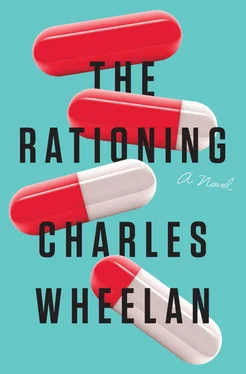“Exactly,” the Prime Minister said, looking over at Patel, presumably to acknowledge his work at the California Pizza Kitchen Summit. There were subtle nods of agreement among the aides in both delegations. Yet the Secretary of State was developing a bad feeling. The conversation had gone on too long—too many dates without a kiss, as one of her mentors at State would describe this kind of situation. The Prime Minister should have closed the deal by now; they had seemingly reached agreement. “We could do reciprocal state visits,” the Prime Minister offered. The longer the conversation went on, the worse the Secretary of State began to feel, regardless of what the PM was saying.
“Sooner rather than later,” the Secretary of State suggested. “The President and First Lady have a special affinity for India.” What is the holdup here? she wondered.
The door to the office opened. An aide scurried to the Prime Minister’s side and handed him a small folded note. “Excuse me,” the Prime Minister said as he read. “My goodness,” he exclaimed. “Your scientists are making great progress.” The press was eagerly reporting our wiki science breakthroughs in real time. The NIH Director reckoned there was little hope in keeping the developments secret, and no compelling reason to do so anyway. It was not a surprise that the Indian Prime Minister was keeping abreast of these scientific developments; it was surprising that an aide had interrupted him with specific news . The Ambassador and the Secretary of State exchanged a puzzled glance. “This is very exciting,” the Prime Minister said.
“We are still a very long way from having any actionable findings,” the Secretary of State said, as if she were reassuring him that his magnanimity would not be supplanted at the last minute by some scientific miracle. Both the Ambassador and the Secretary of State later described this moment in the conversation at length in their respective memoirs, but somehow it got lost in the wider public discussion of the Outbreak. Our remarkable research efforts at the NIH and this bizarre diplomatic chapter in India were inextricably linked. Yes, they were two different paths we pursued for managing the Dormigen shortage, but they converged in the Prime Minister’s office in those few delicate moments. The science—the possibility that our unprecedented network of scientists would render Dormigen unnecessary—offered the Secretary of State the only leverage she had.
“I think it would be to India’s great advantage if we were able to assist during this crisis,” the Prime Minister said, which was just a restatement of what he had been saying since the meeting began. The members of both delegations nodded in agreement. More dating, still no kissing , the Secretary of State thought. The Prime Minister continued, “Perhaps we could have a private session?”
“Of course,” the Secretary of State agreed. Anything to encourage him to get to the point. The various aides began to file out of the room. And if he’s going to ask about the F-80 , the Secretary thought, the fewer people in the room, the better .
“Would it be okay for Mr. Patel and the Ambassador to stay?” the Prime Minister asked.
“Yes, of course,” the Secretary of State said. Patel and the U.S. Ambassador moved their chairs closer to the principals. Neither one of them said much during the balance of the meeting, but we are fortunate that the Ambassador was there to substantiate the Secretary’s account of the extraordinary conversation that followed.
The Prime Minister leaned forward, placing his fingertips together, almost like a little prayer. “This is very exciting, yes?” he asked. The Secretary did not know quite what to make of the question. She had spent every wakeful hour in recent days pleading with world leaders, fending off Chinese aggression, dealing with petty members of Congress, and squabbling with her fellow cabinet members. The most recent NIH projection was that between thirty-seven thousand and a hundred and eleven thousand people would die prematurely in the United States due to Capellaviridae . She could think of a lot of adjectives—“frustrating,” “infuriating,” “tragic,” “exhausting”—but “exciting” was not on the list. The Prime Minister must have read her expression, because he added, “Not the Outbreak, of course, but that it can be a catalyst for better relations between the world’s two most important democracies.”
“I hope so,” the Secretary of State said cautiously.
“I have two personal requests,” the Prime Minister offered.
“Please,” the Secretary answered, inviting him to continue. She had known something was coming, but a “personal request”? Her mind was racing. The F-80 would hardly be a “personal request.” Did the PM have teenage children? How many times had she been asked by foreign leaders to get their children into Harvard, Princeton, or Yale?
“It would be very beneficial for India to assist the United States with your Dormigen situation,” the Prime Minister said.
“Yes, I think we’ve established that,” the Secretary responded. Patience is like a muscle; it grows stronger when exercised. But even the Secretary’s prodigious patience, exercised constantly by rambling Russian diatribes and verbose NATO bureaucrats and lying Iranian negotiators, was growing fatigued.
“It would be good for me, too, politically,” the Prime Minister said. The Secretary and the Ambassador nodded in understanding. He continued, “I would never put my political interests ahead of what is good for my country— never .”
“There’s no reason they can’t be aligned,” the Secretary said, urging him along.
“Yes! Exactly.” He seemed relieved that his visitors grasped this point. “In that spirit, I have two requests to help keep these interests ‘aligned,’ as you say.”
“You are in a position to save a lot of lives, Mr. Prime Minister. I will do whatever I can,” the Secretary said honestly.
“Hmm, yes.” The Prime Minister was a remarkably articulate man, but he was clearly stumbling for words. “Well, first,” he began, “I would like to make sure that India gets the appropriate credit for this generous donation.”
“Obviously,” the Secretary said emphatically. She was still entirely puzzled as to where this was going.
“The scientific discoveries around this virus are moving very quickly,” the Prime Minister explained. “That’s a good thing, obviously. Please don’t get me wrong.”
Finally , the Secretary thought. So that was it: The Prime Minister was worried about being upstaged by some last-minute discovery. Not merely upstaged, but embarrassed. Nothing would be worse for his political standing at home than making a high-profile announcement offering assistance to the United States, loading up Indian cargo planes with Dormigen, and then having the whole effort rendered unnecessary—foolish, even—by this wiki Manhattan Project. India, the perpetual junior partner in the relationship, would have its planes loaded up with nowhere to go.
The Secretary of State felt a wave of relief. This she could manage . “I understand completely,” she assured the Prime Minister. Because she did. Her job was to prevent any potential embarrassment for the PM or his nation. “I’m thinking out loud here, but tell me what you think of this,” she said, pausing to gather her thoughts. “The President obviously cannot suspend the research efforts—it would be imprudent, and he couldn’t stop the progress even if he wanted to.”
“I understand.”
“But he can certainly make a statement—an entirely truthful statement—telling the American people that those efforts have not yielded a Dormigen substitute and will not in the time we have left. They’ve failed. I don’t think he would use the word ‘failed,’ because it’s been a remarkably impressive scientific effort all things considered, but the time has passed for the science to bail us out.”
Читать дальше












